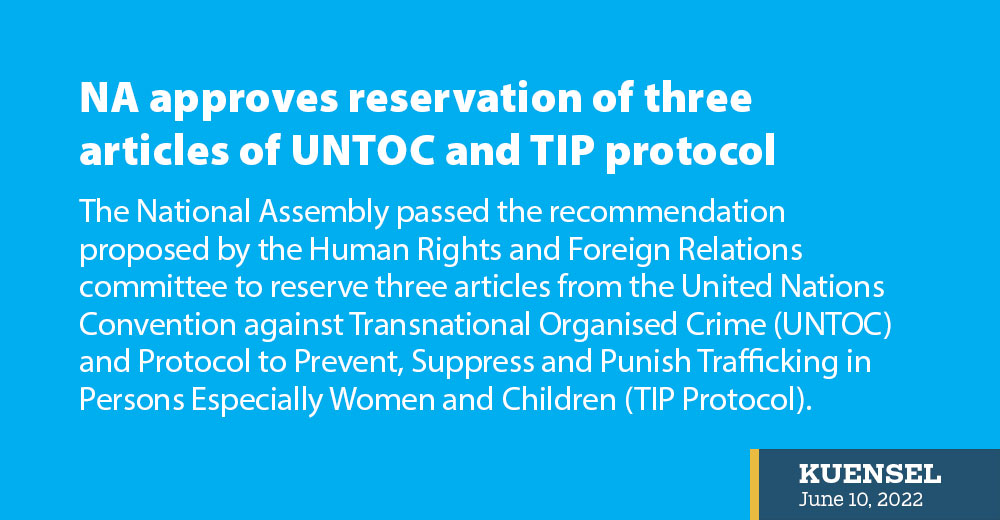Phub Dem
The National Assembly passed the recommendation proposed by the Human Rights and Foreign Relations committee to reserve three articles from the United Nations Convention against Transnational Organised Crime (UNTOC) and Protocol to Prevent, Suppress and Punish Trafficking in Persons Especially Women and Children (TIP Protocol).
The committee recommended accepting the reservation proposed by the government on Article 16.5 (a) and Article 35.3 of UNTOC and article 15.3 of the TIP Protocol.
The House deliberated on all 41 articles of the UNTOC and 20 articles of the TIP Protocol before deliberating the recommendations made by the committee.
The chairperson of the Human Rights and Foreign Relations Committee, Rinzin Jamtsho, reported that the committee’s recommendations are the results of several consultation meetings held with the relevant agencies and experts.
While the overall convention is found beneficial, he said that some clauses concern the country.
Article 16.5 (a) states that at the time of deposit of their instrument of ratification, acceptance, approval of or accession to this Convention, inform the Secretary-General of the United Nations whether they will take this Convention as the legal basis for cooperation on extradition with other States Parties to this Convention.
According to the national interest analysis on the UNTOC, it was agreed that it is not an appropriate option for Bhutan to take the Convention as a legal basis for cooperation on extradition which is as per the decision taken during the ratification of UNCAC following consultation among the relevant agencies including ministry of foreign affairs.
Article 35.3 of UNTOC and article 15.3 of the protocol state that each state party may, at the time of signature, ratification, acceptance or approval of or accession to this Convention, declare that it does not consider itself bound by paragraph 2 of this article.
The other States Parties shall not be bound by paragraph 2 of this article concerning any State Party that has made such a reservation.
Paragraph two of the article states that any dispute between two or more States Parties concerning the interpretation or application of the protocol that cannot be settled through negotiation within a reasonable time shall, at the request of one of those States Parties, be submitted to arbitration. “If six months after the date of the request for arbitration, those States Parties are unable to agree on the organization of the arbitration, any one of those States Parties may refer the dispute to the International Court of Justice by request following the Statute of the Court.”
As per the analysis, the Anti-Corruption Commission also took note of the high cost and resource implication on the country as dispute settlement proceedings include tiers of proceedings such as negotiation, arbitration and adjudication by the international court of justice during the ratification of UNCAC.
Members of the Parliament (MPs) discussed the advantages of ratifying the convention, which includes the country’s commitment to combating transnational organised crime and strengthening domestic legislation and other national mechanisms against transnational organized crimes, improving Bhutan’s compliance with international law(s) on trafficking and benefit Bhutan’s UPR review, and will indicate the government’s commitment to the gradual ratification of international instruments.
However, some members argued that ratification of international conventions comes with obligations, adding that the country should ensure that existing national laws are in sync with international laws.
During the consultations for national interest analysis, it was noted that major changes to national laws and policies will not be required.
They also said that to implement the provisions of the Convention and the TIP Protocol, amendments to a few existing legislation will be necessary.
Opposition leader Dorji Wangdi said that accepting the article could benefit the country in not having to make an extradition treaty with every 190 countries, adding that there was a risk of other countries not being willing to sign the extradition treaty if the provision is reserved.
He even questioned the committee and the government if ratifying the convention has an impact on the existing law of the country.
Minister of Home and Culture Affairs, Ugyen Dorji, said that amendments and reviews of existing legislation are underway.
He added that the Mutual Legal Assistance Act has been finalised by the Department of Law and Order and will be presented in the parliament.
Lyonpo cited the example of how the National Commission for Women and Children is reviewing the definition of Child trafficking which needs to be amended in line with international standards.
Some members of the parliament, including the opposition leader and foreign affairs minister, proposed to approve the articles as it will be necessary and beneficial to the country in the long run.
Others, however, argued that it was wise to reserve the articles for now, as there was a provision to approve them in the future.
The House will convene tomorrow to formally ratify both the UNTOC and TIP Protocol.


